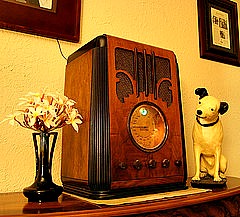 |
| (Tropic-7's photostream/Flickr) |
reporting on historic events, made major contributions in the propaganda war against Nazi Germany, and also led international broadcasts to the Soviet Union and Eastern Europe during the Cold War. So, we are speaking here of a media institution of historical importance. However, as so many old media these days, now even the BBC has to make cutbacks. However, does this cutback make sense?
When I heard of the closure of the 648 kHz transmissions, I was very concerned. I’ve been an avid listener to this service since my childhood: listening to my small transistor radio at night before going to sleep: it was like traveling to many places around the world at once from the cities of Lahore, London and Prague to the kasbahs of the Middle East, and the townships of Soweto. I listened to the world news and heard from war zones, it gave me access to sports events from Wimbledon to English football matches, and it introduced me to America with Alistair Cooke’s Letter from America which influenced my moving to the U.S. years later.
In the U.S., BBC World Service is broadcasted with intervals on NPR, including in the middle of the night. Not ideal, but at least doable. In Europe, however, once the 648 kHz broadcasts ended listeners can only listen to the BBC World Service by satellite, cable and online. Well, that’s really “great”: my car doesn’t have any cable, internet or satellite connection, as is the case with most if not all cars in Europe. Now I am forced to listen to empty chatter or mind numbing local news. Thank you, BBC, for taking away my access to the world. Thank you for offering us no real broadcasting alternatives in Europe. The BBC is like a restaurant offering a great menu to choose from, with one little caveat that is you need to pick up your dinner in a different location a few miles away. BBC’s ending of the 648 kHz frequency, offers another exmample of the unintended consequences of cutbacks. This is not just the end of a frequency, but the end of news broadcasting as it is supposed to be: easily available, with one simple radio, wherever you are.
No comments:
Post a Comment